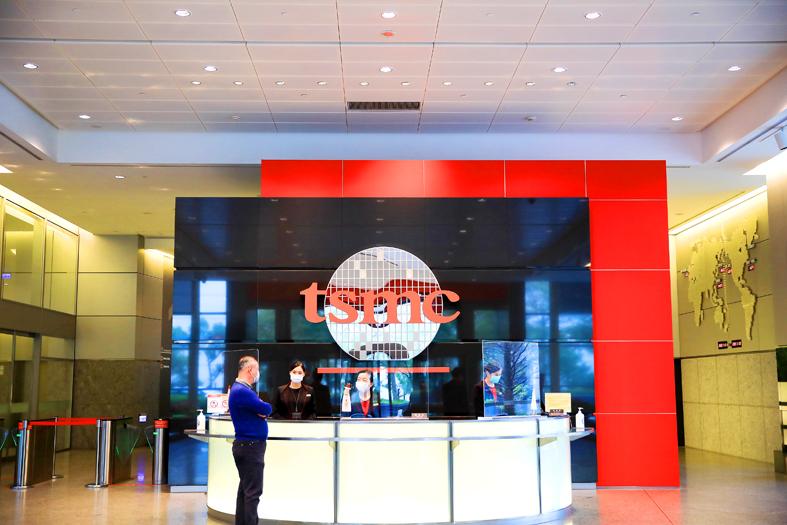Taiwan Semiconductor Manufacturing Co (TSMC, 台積電), the world’s biggest contract chipmaker, has decided to slow down its 3-nanometer chip production as Intel Corp, one of its major customers, plans to push back the launch of its new Meteor Lake tGPU chipsets to the end of next year, market researcher TrendForce Corp (集邦科技) said yesterday.
That means Intel has canceled almost all of the 3-nanometer capacity booked for next year, with only a small amount of wafer input remaining for engineering verification, the Taipei-based researcher said in a report.
Based on Intel’s original schedule, TSMC was to start producing the new chipsets in the second half of this year using its 3-nanometer technology, which would be the most advanced technology in global chip production, TrendForce said.

Photo: Cheng I-hwa, Bloomberg
Issues linked to product design and process verification can be blamed for the delay, it said.
The postponement would severely affect TSMC’s plan to ramp up 3-nanometer chips, as it leaves Apple Inc as the only customer for the technology in the next one-and-a-half years, the researcher said.
Apple plans to adopt the 3-nanometer technology for its M-series processors and A17 Bionic chip, it said.
TSMC has said that it planned to start mass production of 3-nanometer chips in the second half of this year. The chips would be used in high-performance-computing (HPC)and smartphone applications, it said.
To avoid booking hefty depreciation and amortization costs for new 3-nanometer equipment and idled capacity, TSMC has notified its equipment suppliers about the order adjustments for next year, it said.
The order cuts could lead to a reduction in capital spending for next year, compared with this year’s record US$40 billion, given that 3-nanometer equipment is costly, it said.
TrendForce said TSMC should expect a slower revenue growth than expected. The company last month raised its sales growth forecast for this year to 35 percent.
However, 2024 could be a good year for TSMC’s sales and factory utilization, TrendForce said.
Major customers for TSMC’s advanced technology, including Advanced Micro Devices Inc, MediaTek Inc (聯發科) and Qualcomm Inc, are to use the 3-nanometer process technology in 2024 for their cutting-edge chips, while Apple is to fully adopt 3-nanometer chips for its new iPhone series, it said.
In addition, TSMC might see an additional revenue boost from Intel, which could outsource production of its computing tiles to TSMC if its Intel 4 process technology development stagnates, the researcher said.

Hon Hai Precision Industry Co (鴻海精密) yesterday said that its research institute has launched its first advanced artificial intelligence (AI) large language model (LLM) using traditional Chinese, with technology assistance from Nvidia Corp. Hon Hai, also known as Foxconn Technology Group (富士康科技集團), said the LLM, FoxBrain, is expected to improve its data analysis capabilities for smart manufacturing, and electric vehicle and smart city development. An LLM is a type of AI trained on vast amounts of text data and uses deep learning techniques, particularly neural networks, to process and generate language. They are essential for building and improving AI-powered servers. Nvidia provided assistance

DOMESTIC SUPPLY: The probe comes as Donald Trump has called for the repeal of the US$52.7 billion CHIPS and Science Act, which the US Congress passed in 2022 The Office of the US Trade Representative is to hold a hearing tomorrow into older Chinese-made “legacy” semiconductors that could heap more US tariffs on chips from China that power everyday goods from cars to washing machines to telecoms equipment. The probe, which began during former US president Joe Biden’s tenure in December last year, aims to protect US and other semiconductor producers from China’s massive state-driven buildup of domestic chip supply. A 50 percent US tariff on Chinese semiconductors began on Jan. 1. Legacy chips use older manufacturing processes introduced more than a decade ago and are often far simpler than

STILL HOPEFUL: Delayed payment of NT$5.35 billion from an Indian server client sent its earnings plunging last year, but the firm expects a gradual pickup ahead Asustek Computer Inc (華碩), the world’s No. 5 PC vendor, yesterday reported an 87 percent slump in net profit for last year, dragged by a massive overdue payment from an Indian cloud service provider. The Indian customer has delayed payment totaling NT$5.35 billion (US$162.7 million), Asustek chief financial officer Nick Wu (吳長榮) told an online earnings conference. Asustek shipped servers to India between April and June last year. The customer told Asustek that it is launching multiple fundraising projects and expected to repay the debt in the short term, Wu said. The Indian customer accounted for less than 10 percent to Asustek’s

Gasoline and diesel prices this week are to decrease NT$0.5 and NT$1 per liter respectively as international crude prices continued to fall last week, CPC Corp, Taiwan (CPC, 台灣中油) and Formosa Petrochemical Corp (台塑石化) said yesterday. Effective today, gasoline prices at CPC and Formosa stations are to decrease to NT$29.2, NT$30.7 and NT$32.7 per liter for 92, 95 and 98-octane unleaded gasoline respectively, while premium diesel is to cost NT$27.9 per liter at CPC stations and NT$27.7 at Formosa pumps, the companies said in separate statements. Global crude oil prices dropped last week after the eight OPEC+ members said they would